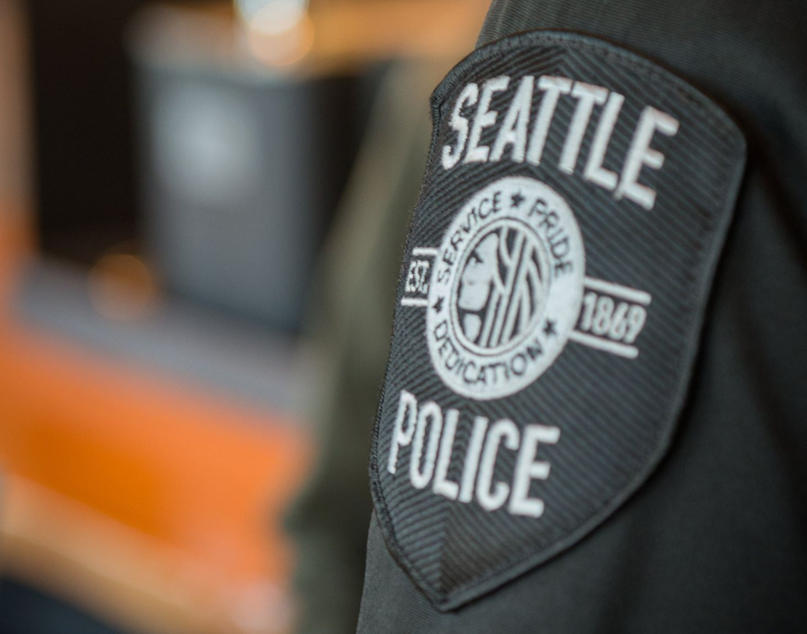More Seattle police officers admit they attended pro-Trump rally in DC

The Seattle Police Department says three more officers have self-reported that they attended the rally in D.C. on January 6, supporting former President Donald Trump's attempts to overturn the 2020 election results.
Those officers will be subject to an internal investigation but will remain on duty.
The announcement means five Seattle police officers, so far, are known to have been at the pro-Trump event. The first two officers were placed on administrative leave after a colleague spotted a photo of them on social media. The Office of Police Accountability is investigating whether any of the officers broke laws or violated SPD policies against undermining public trust and confidence in the department.
It’s presently unclear whether any officers with the department participated in the riot in the U.S. Capitol building. If evidence indicates they did, Office of Police Accountability Director Andrew Myerberg told Seattle's Community Police Commission on Wednesday he will refer his investigation to the FBI. Interim Seattle Police Chief Adrian Diaz has said he would fire those officers.
But if they didn’t enter the Capitol building, Myerberg said they may be cleared of any misconduct.
“Officers do have a First Amendment right to have political beliefs and go to rallies,” he said. “I’ve seen the drumbeat on Twitter to call for the termination of these officers immediately — that’s not going to happen. If they violate the law, for sure there will be consequences.”
But Community Police Commission members said to have Seattle police officers attending an event with racist overtones also harms public trust, whatever any investigations yield. Mark Mullens, one of the commission's members and a fellow Seattle police offcer, told the commission that these investigations raise questions of trust for him.
Mullens, who is Black, said that Black police officers “look outwardly toward the street to guard ourselves against people who mean to harm us, white supremacists, things of that nature. It’s unsettling to think there’s a possibility that someone might be behind you backing you up that’s doing that as well.”
Mullens said that as a young officer, he was questioned for wearing sunglasses that internal investigators falsely believed signaled support for Nation of Islam leader Louis Farrakhan. Now he said he sees colleagues openly showing their support for Trump while in the workplace.
Mullens has asked the Office of Police Accountability to look at “officers and sergeants and lieutenants that walk around the precinct and on city property with MAGA hats." That, he said, "has been a situation that has happened, and I can’t look into the hearts and minds of those guys who do that with a smile and think that’s neat or cool."
He said these acts may be permitted under the First Amendment and department policies, but they still harm relationships with fellow officers and the public.
“More than just the fact that you might be a white supremacist, there’s also the community’s perception of you and the community’s trust that needs to be taken into consideration when you wear the things you wear," he said.
Community Police Commissioner Brandy Grant said she sees discrepancies between the First Amendment rights of officers versus the public.
“The number of considerations that are given to law enforcement — ‘We’re going to give this some time, investigate, really figure this out’ — I wish those same kinds of considerations and respect were given to people who have been marching and protesting in the streets of Seattle for life, for Black and brown lives,” Grant said.
Commissioner Esther Lucero said the group should use this investigation to look at bigger questions, like whether Seattle Police Department screening tools for racial bias are effective.
“To begin to systematically cleanse the system of this type of bias and quite frankly racism,” she said.
Commissioner Douglas Wagoner agreed, saying the commission should use its role to delve deeper into concerns about racial bias or sympathy for right-wing extremism within the police department.
“What more can we do to understand how deep the iceberg really is here?” he asked. “Because I can’t think of anything more problematic for trust between SPD and the community, especially at this already tenuous moment, than to find out that there are potential officers that were potentially involved in this attempted coup.”
Wagoner said a positive note is that the two officers first reported for going to the D.C. rally were flagged by a colleague who saw their photo on social media and reported potential misconduct to their superiors. That’s “what we would want to happen,” Wagoner said.
The Community Police Commission's longtime co-chair Reverend Harriett Walden said the riot at the Capitol shows, “We have not dug up the root of hatred in America” toward Black and Indigenous people. “We cannot dance around this issue” she said, and further offered to be part of any work group or inquiry that the commission decides to undertake.

